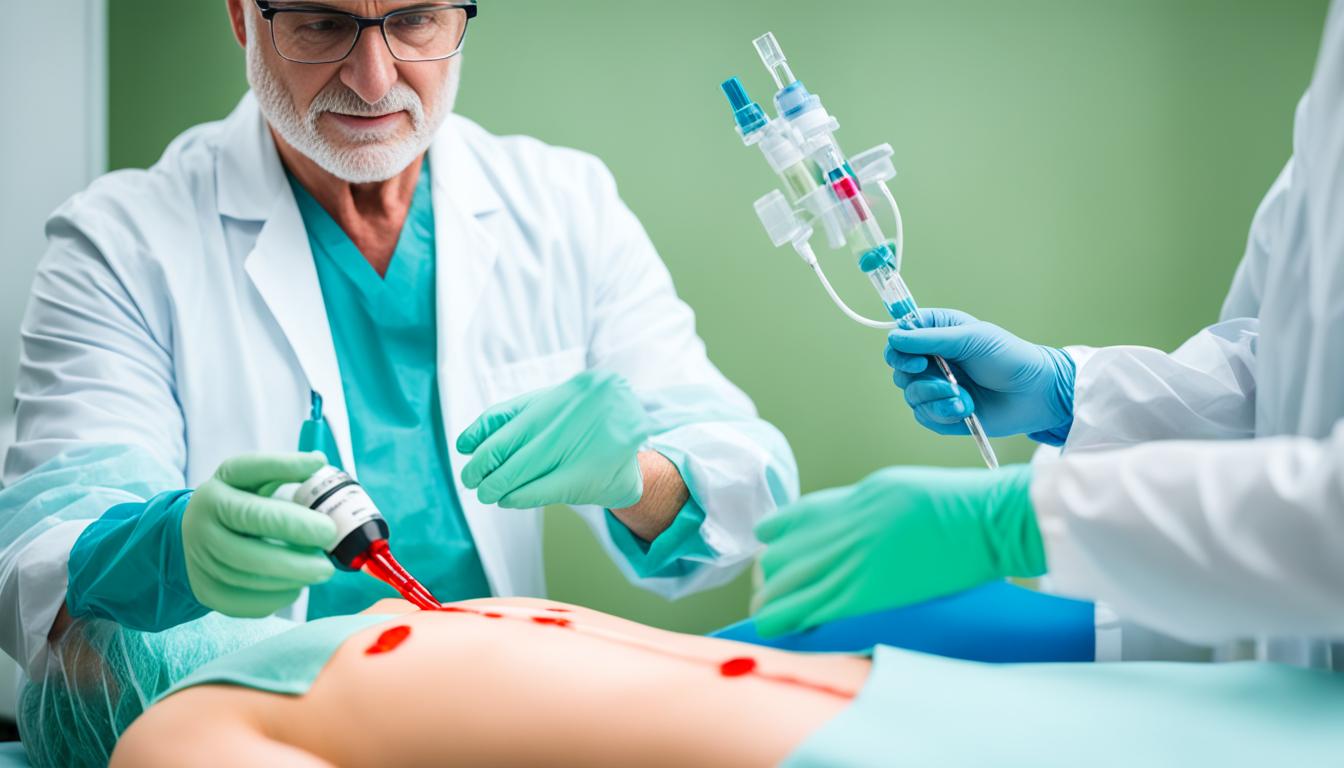Lactase deficiency, often called lactose intolerance, makes it hard to digest milk sugar. This leads to issues like stomach pain, gas, and diarrhea. The body either makes too little lactase from birth or produces less over time.
Doctors diagnose this by using special tests. If you have it, you may need to avoid milk products. Also, taking lactase pills might help.
Stem cell treatment is a new idea for solving this issue. But it’s not fully proven yet. More research is needed to check if it really works.
Key Takeaways:
- Lactase deficiency, or lactose intolerance, makes it tough to handle milk sugar.
- Symptoms are stomach problems like pain, bloating, or gas, and diarrhea.
- It might happen from birth or later in life, making milk hard to digest.
- Diagnosing it involves tests that check how well you digest milk sugar.
- Treating it often means not eating dairy and taking special pills.
- There’s hope with stem cell treatment, yet more research is required.
Symptoms of Lactase Deficiency
Lactase deficiency, also called lactose intolerance, leads to issues after having dairy. You might feel pain in your stomach, bloating, and pass a lot of gas, with diarrhea. Some find it just a bit uncomfortable, while it can be very hard for others. Remember, these signs could mean different things, so you need a doctor to check it out.
Think you might be lactose intolerant? It’s best to see a doctor. They can test you for a definite answer and make sure nothing else is causing these symptoms.
Common Symptoms of Lactase Deficiency:
- Abdominal pain: This pain varies but can be quite strong.
- Bloating: Too much gas makes you feel bloated and full.
- Flatulence: Not breaking down lactose well results in lots of gas.
- Diarrhea: It can cause loose, watery stools that you need to go a lot.
Know that signs of lactase deficiency differ from person to person. You might have just a few or a mix of these symptoms. And how bad they are can also change.
Figuring out your symptoms and getting the right help is key. It can make dealing with lactase deficiency easier and better your daily life.
| Symptom | Description |
|---|---|
| Abdominal pain | Mild to severe discomfort in the abdominal region. |
| Bloating | Feeling of fullness and distension in the abdomen due to excessive gas. |
| Flatulence | Passing gas frequently due to increased gas production in the gastrointestinal tract. |
| Diarrhea | Watery bowel movements that may be urgent and frequent. |
Causes of Lactase Deficiency
Lactase deficiency, or lactose intolerance, can happen for different reasons. It often depends on when it starts. The main reasons are being born with it (congenital lactase deficiency) and losing the ability to digest lactose over time (lactase nonpersistence).
Congenital lactase deficiency:
This type is really rare and starts from birth. It happens because of changes in the LCT gene. This gene affects how the body makes the lactase enzyme. Babies with this might have a lot of stomach problems like diarrhea and pain. Because it’s not common, doctors need to carefully help these babies feel better and grow well.
Lactase nonpersistence:
In contrast, lactase nonpersistence is more common as people grow up. After being a baby, their body may make less lactase. This happens because of genes like MCM6 that control LCT’s activity. When this enzyme decreases, the body can’t fully break down lactose. Some people, especially those from East Asia, are more likely to have this issue.
It’s important to know why lactase deficiency happens. This knowledge helps us find ways to support those dealing with it.
Managing Lactase Deficiency Symptoms
Managing lactase deficiency symptoms is all about the right diet. Many people go for a lactose-free diet. This means they avoid foods and drinks with lactose in them. Luckily, they can find many lactose-free options like milk without lactose or from plants. This way, people with lactase deficiency can still enjoy dairy without the bad symptoms.
Some people also use lactase enzyme supplements. They take these before eating food with lactose. The supplements help the body digest lactose and lessen any bad reactions. For others, adding small amounts of lactose back into their diet gradually can help. This lets their bodies get used to lactose again, making it easier to eat some dairy.
But, watching what you eat is key for those with lactase deficiency. Lactose might be in foods you don’t expect. Reading food labels and being cautious is very important. If unsure, getting advice from a healthcare pro or dietitian is a good idea. They can help create a diet that meets your nutritional needs without causing symptoms.

